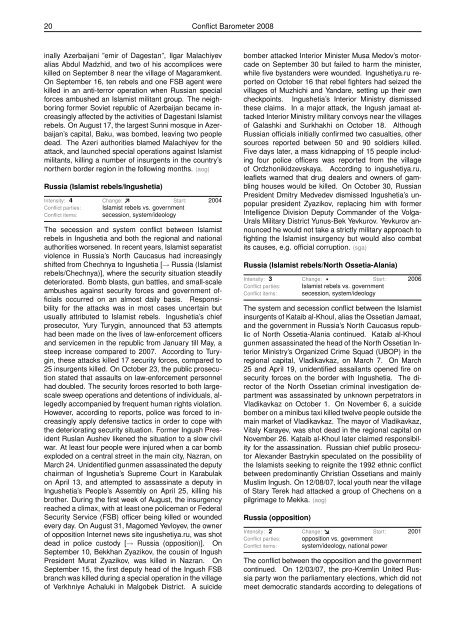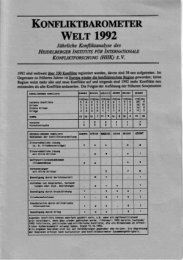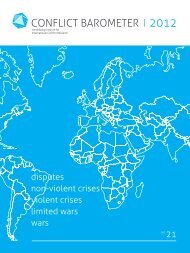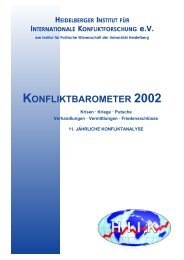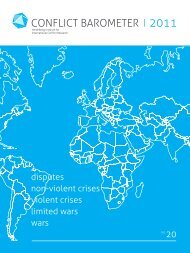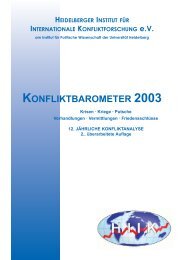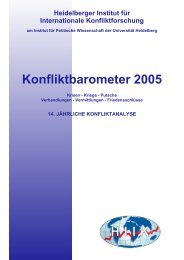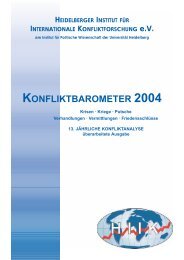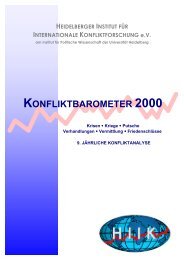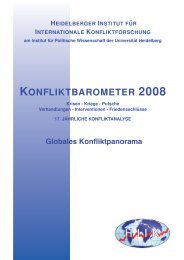CONFLICT BAROMETER 2008
CONFLICT BAROMETER 2008
CONFLICT BAROMETER 2008
You also want an ePaper? Increase the reach of your titles
YUMPU automatically turns print PDFs into web optimized ePapers that Google loves.
20 Conflict Barometer <strong>2008</strong><br />
inally Azerbaijani ”emir of Dagestan”, Ilgar Malachiyev<br />
alias Abdul Madzhid, and two of his accomplices were<br />
killed on September 8 near the village of Magaramkent.<br />
On September 16, ten rebels and one FSB agent were<br />
killed in an anti-terror operation when Russian special<br />
forces ambushed an Islamist militant group. The neighboring<br />
former Soviet republic of Azerbaijan became increasingly<br />
affected by the activities of Dagestani Islamist<br />
rebels. On August 17, the largest Sunni mosque in Azerbaijan’s<br />
capital, Baku, was bombed, leaving two people<br />
dead. The Azeri authorities blamed Malachiyev for the<br />
attack, and launched special operations against Islamist<br />
militants, killing a number of insurgents in the country’s<br />
northern border region in the following months. (aog)<br />
Russia (Islamist rebels/Ingushetia)<br />
Intensity: 4 Change: Start: 2004<br />
Conflict parties: Islamist rebels vs. government<br />
Conflict items: secession, system/ideology<br />
The secession and system conflict between Islamist<br />
rebels in Ingushetia and both the regional and national<br />
authorities worsened. In recent years, Islamist separatist<br />
violence in Russia’s North Caucasus had increasingly<br />
shifted from Chechnya to Ingushetia [→ Russia (Islamist<br />
rebels/Chechnya)], where the security situation steadily<br />
deteriorated. Bomb blasts, gun battles, and small-scale<br />
ambushes against security forces and government officials<br />
occurred on an almost daily basis. Responsibility<br />
for the attacks was in most cases uncertain but<br />
usually attributed to Islamist rebels. Ingushetia’s chief<br />
prosecutor, Yury Turygin, announced that 53 attempts<br />
had been made on the lives of law-enforcement officers<br />
and servicemen in the republic from January till May, a<br />
steep increase compared to 2007. According to Turygin,<br />
these attacks killed 17 security forces, compared to<br />
25 insurgents killed. On October 23, the public prosecution<br />
stated that assaults on law-enforcement personnel<br />
had doubled. The security forces resorted to both largescale<br />
sweep operations and detentions of individuals, allegedly<br />
accompanied by frequent human rights violation.<br />
However, according to reports, police was forced to increasingly<br />
apply defensive tactics in order to cope with<br />
the deteriorating security situation. Former Ingush President<br />
Ruslan Aushev likened the situation to a slow civil<br />
war. At least four people were injured when a car bomb<br />
exploded on a central street in the main city, Nazran, on<br />
March 24. Unidentified gunmen assassinated the deputy<br />
chairman of Ingushetia’s Supreme Court in Karabulak<br />
on April 13, and attempted to assassinate a deputy in<br />
Ingushetia’s People’s Assembly on April 25, killing his<br />
brother. During the first week of August, the insurgency<br />
reached a climax, with at least one policeman or Federal<br />
Security Service (FSB) officer being killed or wounded<br />
every day. On August 31, Magomed Yevloyev, the owner<br />
of opposition Internet news site ingushetiya.ru, was shot<br />
dead in police custody [→ Russia (opposition)]. On<br />
September 10, Bekkhan Zyazikov, the cousin of Ingush<br />
President Murat Zyazikov, was killed in Nazran. On<br />
September 15, the first deputy head of the Ingush FSB<br />
branch was killed during a special operation in the village<br />
of Verkhniye Achaluki in Malgobek District. A suicide<br />
bomber attacked Interior Minister Musa Medov’s motorcade<br />
on September 30 but failed to harm the minister,<br />
while five bystanders were wounded. Ingushetiya.ru reported<br />
on October 16 that rebel fighters had seized the<br />
villages of Muzhichi and Yandare, setting up their own<br />
checkpoints. Ingushetia’s Interior Ministry dismissed<br />
these claims. In a major attack, the Ingush jamaat attacked<br />
Interior Ministry military convoys near the villages<br />
of Galashki and Surkhakhi on October 18. Although<br />
Russian officials initially confirmed two casualties, other<br />
sources reported between 50 and 90 soldiers killed.<br />
Five days later, a mass kidnapping of 15 people including<br />
four police officers was reported from the village<br />
of Ordzhonikidzevskaya. According to ingushetiya.ru,<br />
leaflets warned that drug dealers and owners of gambling<br />
houses would be killed. On October 30, Russian<br />
President Dmitry Medvedev dismissed Ingushetia’s unpopular<br />
president Zyazikov, replacing him with former<br />
Intelligence Division Deputy Commander of the Volga-<br />
Urals Military District Yunus-Bek Yevkurov. Yevkurov announced<br />
he would not take a strictly military approach to<br />
fighting the Islamist insurgency but would also combat<br />
its causes, e.g. official corruption. (sga)<br />
Russia (Islamist rebels/North Ossetia-Alania)<br />
Intensity: 3 Change: Start: 2006<br />
Conflict parties: Islamist rebels vs. government<br />
Conflict items: secession, system/ideology<br />
The system and secession conflict between the Islamist<br />
insurgents of Kataib al-Khoul, alias the Ossetian Jamaat,<br />
and the government in Russia’s North Caucasus republic<br />
of North Ossetia-Alania continued. Kataib al-Khoul<br />
gunmen assassinated the head of the North Ossetian Interior<br />
Ministry’s Organized Crime Squad (UBOP) in the<br />
regional capital, Vladikavkaz, on March 7. On March<br />
25 and April 19, unidentified assailants opened fire on<br />
security forces on the border with Ingushetia. The director<br />
of the North Ossetian criminal investigation department<br />
was assassinated by unknown perpetrators in<br />
Vladikavkaz on October 1. On November 6, a suicide<br />
bomber on a minibus taxi killed twelve people outside the<br />
main market of Vladikavkaz. The mayor of Vladikavkaz,<br />
Vitaly Karayev, was shot dead in the regional capital on<br />
November 26. Kataib al-Khoul later claimed responsibility<br />
for the assassination. Russian chief public prosecutor<br />
Alexander Bastrykin speculated on the possibility of<br />
the Islamists seeking to reignite the 1992 ethnic conflict<br />
between predominantly Christian Ossetians and mainly<br />
Muslim Ingush. On 12/08/07, local youth near the village<br />
of Stary Terek had attacked a group of Chechens on a<br />
pilgrimage to Mekka. (aog)<br />
Russia (opposition)<br />
Intensity: 2 Change: Start: 2001<br />
Conflict parties: opposition vs. government<br />
Conflict items: system/ideology, national power<br />
The conflict between the opposition and the government<br />
continued. On 12/03/07, the pro-Kremlin United Russia<br />
party won the parliamentary elections, which did not<br />
meet democratic standards according to delegations of


